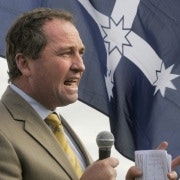Christopher Pyne and the dangerous fantasy of surplus
Christopher Pyne, yesterday: "Well if there had been a Coalition government for the last five years, Kieran, I think most people accept that we would have had continuing surpluses."
Whether "most people" accept that might be a matter for pollsters, but it's easy enough to use historical data from the budget papers to work out the maths for Pyne's claim.
Under the Howard government, spending rose an average of $14.5 billion a year between 2001-02 and 2007-08. Assuming this rate of growth had been maintained and there was no attempt to respond to the impacts of the global financial crisis (even though Malcolm Turnbull supported the Rudd government's first set of stimulus payments), the Coalition would have indeed recorded a surplus in 2008-09, but then sunk over $16 billion into the red in 2009-10 and nearly $14 billion into the red in 2010-11, due to the sluggish recovery in revenue growth – something they've steadfastly refused to acknowledge in their attacks on Labor's fiscal management. In 2011-12, they would have managed a balanced budget.
So, for Christopher Pyne's statement to be even close to being right, the Coalition would have needed to find an extra $25.7 billion in revenue, or find $25.7 billion in cuts, between 2008-09 and 2011-12 just to get back to balance, let alone generate surpluses. And that's without a skerrick of stimulus.
So, pop quiz for Pyne: which new taxes would you have put in place, or which programs would you have cut, to address that $26 billion gap?
But wait: if there'd been no stimulus, the rate of unemployment would have gone up to perhaps 7 per cent or 8 per cent, significantly increasing transfer payments. Consumer and business confidence would have collapsed, with resulting falls in retail and other spending. In the resulting recession, more firms would have collapsed, sending still more people onto the dole queues. Personal income tax revenue would have fallen, GST revenue would have fallen, as would corporate profits, further slashing billions from Commonwealth and state budgets. Putting aside the inconvenience of hundreds of thousands of unemployed Australians, Pyne's Coalition would have had to have found billions more in revenue or cuts in order to keep their surplus.
And, of course, those resulting cuts or tax rises would have driven further economic impacts, slowing the economy further, undermining revenue further, necessitating more cuts or tax rises. You get the point.
The only means of stimulating the economy would have been monetary policy, even though interest rates went down to 'emergency lows' under Labor and the majority of mortgage-holders didn't cut their payments, preferring instead to pay down their debt faster.
That's not a projection or a fantasy, that's the brutal reality of what is happening in Europe right now: in an effort to adhere to a particular fiscal policy regardless of its economic impact, the EU is in a depression – yes, a real, 1930s-style depression – that keeps pushing its fiscal targets further away, never mind the 50 per cent youth unemployment and social dislocation. Austerity doesn't work even at its specific goal of curbing government debt. It's Sisyphean economics and it's destroying a generation of European workers.
What is a fantasy is Pyne's statement, of course, predicated on the broader fantasy peddled by Tony Abbott and Joe Hockey, that the election of a Coalition government next year will magically reset Australia to the Howard years, instantly returning us to a point before the GFC-cruelled revenues, before consumers returned to historical rates of savings and before mining companies began ramping up investment, when the principal task of the federal government was to figure out how to blow the windfall revenues that piled up every year.
That's a political fantasy and good luck to the Coalition in trying to sell it. Maybe enough voters will believe it, who knows. All's fair in love and politics.
The more dangerous fantasy, the one that can and will harm the economy, is the one that insists that budget surpluses are the key goal of economic policy, rather than a tool in the service of broader economic outcomes. Whether you believe it because you're stupid enough to think governments are just like households and must always "live within their means" or you believe it because you have a pathological hatred of debt and think government is always too large, not matter what size it is, it means substituting ideology for thinking, and substituting the means for the ends.
The result is a polity incapable of coherently responding to changing economic circumstances, of doing what the Rudd government did when faced with the challenge of the GFC and retooling its economic approach to preserve jobs. Just ask the Europeans.
This story first appeared on www.crikey.com.au on December 11. Republished with permission.













